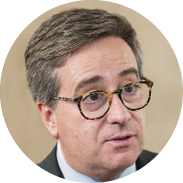David Azevedo Lopes, President of AEON Japão
It was not easy to the first words of this article. And I believe those who read it share this too. We keep talking about Covid and its impact on our lives. Just like someone will choose it as the “word of the year”, someone one of these days will use also an algorithm and artificial intelligence to confirm that the words “Covid” and “Pandemic” were, already in the year 2020, the most repeated words in the history of humanity. There seems to be nothing but the virus and its consequences and this is, in my opinion, worrying and even dangerous. Not because we may be underestimating the rate of contagion and mortality of the virus and its side effects, but because this pandemic has gone to such an extent that is even allowing rights, freedoms and guarantees to be obliterated along with the fact that mediocre politicians and leaders may find here a good excuse for their weak contribution for the common good and for the economic development.
The lives lost are and will always be the most dramatic and terrible consequences of this global pandemic, but also the devastation of millions of jobs that is affecting most citizens of the world, a loss of income that will always hit first and foremost the unskilled and the most fragile. Poverty in childhood and in old age has always been there in Portugal, and despite a positive evolution in the last 30 years Portugal has not been able to eradicate chronic poverty and the huge dependence on the State and social benefits. In view of this, we continue to use the same formula. Increase the tax burden, turning fiscal policy into a punishment, punishing success instead of making it a tool of solidarity and equity. Is there another path? No. The answer is no given that, once again, the new political cycle, which even matched a period of economic growth in Europe, has brought absolutely no reforms with it. Neither in the State nor as regards the conditions that it should have created in order to position itself as an agent of change and supporting innovation and entrepreneurship. Instead we keep look at tourism (we owe this sector a lot, that’s true) and services with low added value as the main generators of change and modernity. The same false idea of modernity and innovation brought by events such as Websummit, paid for by us all, as those who are familiar with the world of technology know that this is something like an “expo-bride event” of the digital sector with a very limited transformation potential.
It was not Covid that brought us here. It was and still is the lack of an idea for the country; The inability to employ Ph.D. students in small and medium-sized enterprises; The difficulty in establishing merit as the common denominator of equal opportunities; The failure to see the technological and innovation component of our products and services grow significantly; The almost total inaction of a country before its greatest resource: the Environment and the Ocean; The despair of a cultural sector that almost succumbs today, not because Covid is stealing the show, but because Portugal never saw it as one of its greatest riches and one of its most important pillars of differentiation. But always, and above all; the failure to demand greater accountability from those who represent us along with the total absence of technical and impartial scrutiny of public policies and investment.
Although only about 50% of the Portuguese population has completed secondary education, we have the most qualified Portuguese ever, high quality universities and an informed and integrated worldview. A Polish philosopher once said that he would exchange his glorious history for a better geography. I dare say that we would not exchange, for anything in this world, neither our history nor our geography.
I have learned from my Japanese colleagues life lessons that are true daily gifts. Success is achieved and celebrated collectively. It is never the work of one person alone. Crises are anticipated and planned, just as we should repair the roof before the rainy season. I go back therefore to a text I wrote one year after the earthquake and Tsunami of 11 March 2011, where more than 20 thousand people disappeared and which helps me understand the strength of collective intelligence, which we lack.
“The impact area of the tsunami, which exceeded ten kilometres from the coastline, is almost fully rebuilt, but its effects have gone global, as they have generated one of the most profound reflections, more than Chernobyl, on the safety of nuclear installations and Germany and the United States have introduced significant changes in their regulatory policy that may help making the world a safer place in the future. Meanwhile in Greater Tokyo, the largest urban agglomeration in the world, with 35 million inhabitants, and all over the country, it was time to pay tribute to those who lost their lives and those who continue to work continuously, with a resilience that makes us realise that there is an inner energy, far bigger than atomic energy or any cataclysm. I finish the day at a tea ceremony. In this country that holds the Portuguese as friends I tell the Japanese round me that there is only one place in Europe where we can plant and harvest tea. They express a genuine surprise when I tell them that place is the island of São Miguel in the Azores. This is also a short story of resistance and resolve. Whenever I tell it I get the meaning of both tea and its ceremony in return. How good it is to hear about things I didn’t know.”







